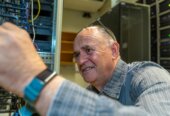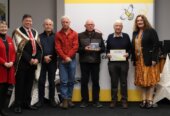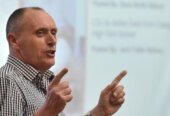
Peter Nicholl, taking a load off in Cambridge’s sunshine.
New columnist Peter Nicholl is a home-grown international economist with the rare knack of turning ‘money chat’ into something universally palatable.
It is exactly that gift that the former Cambridge High School student and sportsman will bring to his monthly columns. His first one, featured this week, focuses on interest rates – what they mean and how they impact our lives. His second, he said, will look at bitcoin and cryptocurrencies.
Penning a monthly piece on topical financial issues and how they tie in with global economies signifies a different pace for the genial septuagenarian; he is more accustomed to travelling the world, consulting on gritty international economic matters.
“I’m very open to doing this now. Besides, Covid-19 has seriously curtailed what I can do internationally, and while I’m still in touch with people abroad, I am not going anywhere soon.”
Peter believes it is important to understand that what happens in the global economic sphere often impacts us all, and his rural Waikato roots, which served him well throughout his career, make him uniquely qualified to deliver this message in this neck of the woods.
It is that very ‘neutral New Zealand-ness’ that gave him an advantage when he was appointed by the International Monetary Fund (IMF) to work in Bosnia, knitting together the requirements of three local vice-governors – one Bosniak, one Croat and one Serb – all seeking different outcomes. It put him at the centre of 76 banks servicing 4.5 million people, effectively juggling 16 houses of parliament and 167 ministers at varying levels.
It was the greatest challenge of his banking career. Peter had worked for the Reserve Bank of New Zealand for 22 years, including as deputy governor, before moving to the US to take on the role as executive director with the World Bank Group in Washington DC. It was at the end of that term that he was invited to deliver the Central Bank of Bosnia and Herzegovina out of its post-war chaos and transform the country’s banking system.
“It was an extraordinary time. They put labels on people but couldn’t find one for me. That’s why I was able to do what I did.”
Peter’s success at turning their banking system around following the breakup of Yugoslavia in the 1990s saw him granted citizenship in 2002, principally to enable him to stay on longer. His work in Bosnia netted him a QSM in 2006.
None of it was really planned, he said. “I left New Zealand to spend about two years overseas … that turned into 20 years. I came back here five years ago.”
Covid has added another dimension to global economics, he added. “There are changes happening everywhere. We are seeing economic power shifting from the west to Asia … there is a lot bubbling away under the surface. It is going to be a very interesting time.”
See Peter’s first column here.









